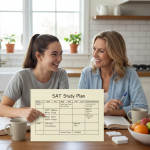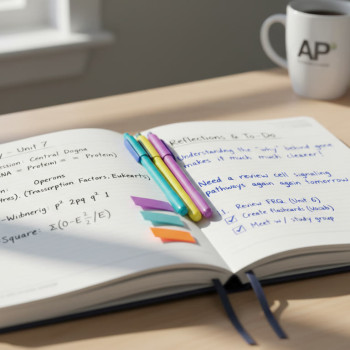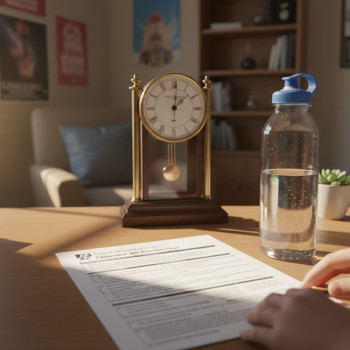Introduction: Why Multiple AP Exams in One Week Feels Like Juggling Fire
It’s real: some of you will take more than one AP exam within the same seven-day window. Maybe it’s two tests on adjacent days, maybe three in a row. Maybe you signed up for a passion-packed schedule (kudos), or your school’s testing calendar just lined up that way (no kudos). Whatever the reason, the rut of back-to-back high-stakes testing can make even the calmest student feel nervous, tired, and a little behind.
This guide is written for that student—busy, bright, overwhelmed, and determined. We’ll walk through a practical, human-centered plan that balances study strategy, mental and physical recovery, logistics, and small hacks that stack into big gains. You’ll get checklists, a realistic timeline, and sample day-by-day plans for common exam pairings. We’ll even include a simple table you can screenshot and carry with you.
Note: if you want targeted, one-on-one guidance while coordinating multiple exams, Sparkl’s personalized tutoring offers tailored study plans, expert tutors, and AI-driven insights that can help you prioritize content and improve efficiency without burning out.

Step 1 — Map Everything Out: The Foundation of Calm
Start with the Facts
Before you do anything else, gather the objective details. These are non-negotiables you need to put on a single page or an app:
- Exam names and formats (multiple choice only? long-form free response?).
- Exact dates and times (local time), including any late-testing arrangements.
- Location and commute time (in case of off-site testing centers).
- Approved accommodations, if any, and how they change the timing.
- Materials allowed (calculator model, permitted notes, ID).
Write these on the top of a single page or the top of your phone note. Having one trustworthy reference reduces friction and lowers stress when the week gets busy.
How to Prioritize When the Week Is Dense
Not all AP exams are created equal for you. A physics test may demand different muscles than an AP English essay. Prioritize using a simple three-factor score:
- Impact: How much does this exam matter for college credit or a specific college major?
- Confidence: How comfortable are you with the course content today?
- Effort-to-Improve: How much can focused study realistically improve your score in the time left?
Give each exam 1–5 points in each category, then sum the scores. Higher totals get earlier, deeper prep blocks. This keeps your limited time from being wasted on diminishing returns.
Step 2 — Design a Week-Of Study Blueprint
The Golden Rule: Small, Focused Sessions Beat Marathon Cramming
In a compressed week, you can’t re-learn whole courses. Instead, practice targeted refinement: micro-reviews, mixed practice, and rapid error correction. Aim for three types of sessions per day during exam week:
- Warm-up (20–30 minutes): Quick content brush-up and active recall.
- Practice (40–60 minutes): Past questions, timed sections, or one FRQ/essay.
- Recovery/Reflection (20 minutes): Review mistakes, update a mistake log, and plan the next micro-session.
Two impactful sessions per subject per day is often enough when time is scarce—particularly if they’re targeted.
Sample Daily Schedule (With an Exam at 8 a.m. Day 3)
This example assumes three exams across five days; adjust to your real calendar.
- Day 1 Morning: 30-min warm-up for Exam A. Focus: most missed concept from practice tests.
- Day 1 Evening: 60-min timed practice set for Exam B.
- Day 2 Morning: Sleep and light review; 30-min active recall for Exam A (flashcards).
- Day 2 Afternoon: Full section timed practice for Exam A (simulate testing pace).
- Day 2 Evening: Relaxed review and plan logistics for exam day.
- Day 3 (Exam A, 8 a.m.): Arrive early, warm-up 15 minutes with a confidence routine; after exam, 30-min unwind then 60-min light review for Exam B.
- Day 4: Full practice for Exam B; early sleep and nutrition focus.
- Day 5: Exam B then rest; do a light check-in for Exam C if it’s later in the week.
Step 3 — Smart Practice: What to Do (and What to Skip)
High-Value Activities
- Timed practice sections that replicate the exact length and constraints of the AP exam.
- Targeted review of your personal mistake log—don’t re-study everything; study your wrongs.
- Mixed practice sets to build retrieval strength across topics (especially useful when switching subjects).
- One full practice exam at most, scheduled a few days before the real test to avoid burnout.
Low-Value Activities (Avoid These in Exam Week)
- Reading entire chapters you’ve already covered—this eats time without meaningfully improving recall.
- Learning brand-new advanced topics unless they’re extremely high-yield for the upcoming exam.
- Late-night marathon sessions that cut into sleep.
Step 4 — Logistics, Materials, and Small Wins for Exam Day
Prepack the Night Before
On a shelf or in a backpack, put together a short checklist and pack it the night before each exam. A prepacked kit reduces decision fatigue and gives you one less thing to worry about in the morning.
- Valid photo ID.
- Approved calculator (with fresh batteries) and backup if applicable.
- Pencils, erasers, pens allowed for the free-response sections.
- Water and a light snack (check venue rules), comfortable layers, face mask if you prefer.
- Printed copy of accommodations, if applicable.
Morning Routine That Actually Works
You don’t need a manifest—just a short, repeatable routine that primes focus:
- Wake up with at least 2 hours before test time if possible.
- Light movement (5–10 minutes): walk, stretch, or gentle yoga.
- Protein-rich breakfast and hydration—avoid heavy, greasy food that makes you sluggish.
- 5-minute focused review: one cheat sheet of formulas, thesis templates, or key dates—nothing new.
- Deep breath, positive cue: one sentence reminder of your preparation (e.g., “I’ve practiced under time; I know what to do.”).
Step 5 — Recovery Between Tests: The Secret Multiplier
Why Recovery Matters
Your brain doesn’t learn while you’re cramming; it consolidates during rest. When exams cluster, targeted recovery—sleep, nutrition, micro-breaks, hydration—amplifies all the hours you put into study.
Immediate Post-Exam Ritual (20–90 Minutes)
- Unplug for at least 20–30 minutes—no social media scrolling that reactivates stress.
- Take a 20-minute nap if needed; even a short rest can recharge attention.
- Do a short active review: note what felt hard and what surprised you. Add to your mistake log.
- Refuel with a balanced snack: carbs + protein (e.g., banana and peanut butter).
Step 6 — Mental Game: Managing Stress, Not Eliminating It
Small Psychological Tools That Work
- Pre-performance routine: a 3-step ritual you do before each exam (breathing, posture check, positive phrase).
- Chunk your time into doable bits during the test: e.g., “I’ll do the first 10 questions in 12 minutes.”
- Label your feelings: saying “I’m anxious” out loud or on paper reduces its intensity.
- Short micro-meditations (3–5 minutes) between exams to reset focus. Use breathing: 4-6-8 pattern.
Remember: stress isn’t the problem—it’s how you carry it. Turning anxiety into focused energy is the point.
Step 7 — When Conflicts Happen: Late Testing and Accommodations
If Two Exams Are Scheduled at the Same Time
College Board’s policy allows late testing for exams that conflict. If you find yourself booked for two simultaneous tests, talk to your AP coordinator as soon as possible to shift one exam to late testing. Don’t assume the system will resolve it automatically—act early.
If You Need Multiple-Day or Extended-Time Accommodations
Work with your school’s Services for Students with Disabilities (SSD) coordinator to make sure the right steps are in place. Some accommodations require setup in the district/school portal well before test day. Confirm locations, proctor assignments, and any special materials at least a week in advance.
Pro tip: If you have accommodations that require separate rooms or extra breaks, plan your day around longer transition times so you aren’t rushed from one test to the next.
Example Plans for Common Pairings
Below are sample, realistic plans for a few common back-to-back scenarios. Use them as templates—adapt times and specifics to your own life.
Scenario A: AP Calculus AB (Monday) + AP Physics 1 (Tuesday)
These two demand problem-solving stamina and formula recall. Prioritize mixed problem sets and formula sheets.
- 3 days before: Timed section for Calculus; 45 minutes on integration techniques and common FRQ formats.
- 2 days before: Timed physics section; cover kinematics and energy problems with 30-minute practice sets.
- Evening before Calculus: Light review only; no heavy new problem-solving after 9 p.m.
- After Calculus: 60-minute active recovery then 30-minute targeted physics set focused on your weakest concept.
Scenario B: AP English Literature (Wednesday Morning) + AP US History (Wednesday Afternoon)
The same day? Switch cognitive modes: analytical close reading in the morning and broad, narrative memory in the afternoon.
- Morning Routine (English): 10-minute close reading warm-up with a short poem or paragraph; outline practice for thesis and topic sentences.
- Between Exams: 45-minute lunch and a short walk; 20-minute US History skim of a few key timelines and cause-effect chains.
- Afternoon (US History): Use your one-page timeline crib sheet (no new memorization—focus on connecting causes to consequences).
Scenario C: Three Exams in Five Days: Balancing Energy
Stagger intensity. Make the middle day lighter—choose recovery and targeted practice, not full practice exams.
- Day 1: Full simulated section for your highest-priority exam.
- Day 2: Recovery and targeted micro-practice for Exam 2.
- Day 3: Exam 1, then immediate short recovery.
- Day 4: Focused practice for Exam 3.
- Day 5: Exam 3 or Exam 2 depending on the schedule; prioritize sleep before both midweek tests.
One Handy Table: Quick-Reference Plan Based on Exam Types
| Exam Type | High-Yield Pre-Exam Session | Ideal Morning Routine | Post-Exam Recovery |
|---|---|---|---|
| STEM (Calculus, Physics, Chemistry) | 40–60 min timed problem set + 20 min error log | Formula sheet review + 5 min light stretching | Protein snack + 20–30 min nap or walk |
| Humanities (History, English) | One timed essay or document-analysis + thesis mapping | Outline templates + 5 min breathing | Short walk + immediate 15 min note of surprises |
| Languages | 30 min active recall (speaking/writing) + listening practice | Quick vocab review + warm-up speaking lines | Rest + gentle review of flashcards |
Study Tools and Shortcuts That Amplify Limited Time
Mistake Log: Your Most Valuable Asset
Keep a compact notebook or note on your phone with three columns: Problem, Why I Missed It, Correct Approach. Spend your last 20 minutes before sleep reviewing the most recent ten entries. Tiny, consistent corrections beat big, messy re-study.
Mixed Practice Blocks
When subjects alternate in the week, practice mixing problems from multiple exams in one session. This builds cognitive flexibility and reduces the disorientation of switching modes during test week.
Micro-Feedback from Sparkl’s Personalized Tutoring
If you’re short on time and need to focus, a few Sparkl tutoring sessions can be transformational. Their expert tutors offer 1-on-1 guidance, create tailored study plans, and use AI-driven insights to highlight the highest-impact weak points—so you practice smarter, not longer.
Sleep, Nutrition, and Movement: The Non-Negotiables
When exams cluster, it’s tempting to skip sleep and subsist on coffee. Don’t. Prioritize sleep as if it were a study subject: schedule it, protect it, and treat it like a tiny exam you take every night.
- Target 7–9 hours nightly in the week leading to exams.
- Even one night of 6 hours instead of 8 reduces cognitive performance noticeably—plan buffer nights before heavy days.
- Hydrate constantly; dehydration reduces working memory.
- Steady carbs + protein before tests—oatmeal, eggs, yogurt, or a nut butter sandwich work well.
- Move for 10–20 minutes between exams to reset circulation and attention.
When Things Go Wrong: Missed Alarm, Sick Day, or Unexpected Conflicts
First: breathe. Most problems are fixable.
- Missed Alarm: Call your AP coordinator immediately. They’ll advise on options; there are policies for late testing or makeup options depending on circumstances.
- Sick on Exam Day: Communicate with your AP coordinator and your parent/guardian. Medical documentation may be needed for rescheduling or makeup arrangements.
- Conflict with Another Exam: Talk to your AP coordinator ASAP to request late testing for one of the exams.
Pro tip: Keep the coordinator’s contact info in your phone and a screenshot of your test schedule handy. Timely, calm communication often creates more flexibility than you expect.
Final Week Checklist — Print This and Bring It With You
- All exam dates/times/locations confirmed and on one page.
- Prepacked kit for each exam (ID, materials, snacks).
- Two prioritized study goals for each exam (not ten).
- Mistake log up to date and reviewed nightly.
- Sleep schedule set and shared with family for accountability.
- AP coordinator contact info and accommodation confirmations saved.

Conclusion: Less Panic, More Plan
Coordinating multiple AP exams in one week is challenging but entirely manageable with the right approach. The real wins come from planning ahead, focusing on high-value practice, treating recovery as essential study time, and making smart logistical choices. Keep your mistake log active, protect your sleep, and use micro-sessions that target your unique weak points.
If you want tailored help building a week-of plan or a focused study guide that targets exactly what will move your score most, Sparkl’s personalized tutoring offers 1-on-1 guidance, tailored study plans, expert tutors, and AI-driven insights to make the most of every hour you have. A few strategic sessions often produces clearer focus and less wasted time—especially when tests cluster.
You’ve already done the hardest part by signing up, showing up, and caring. Now use structure, tiny rituals, and focused practice to turn your effort into results. One exam at a time. One win at a time.
Parting Encouragement
At the end of a crowded week, what matters isn’t perfection—it’s progress. Keep perspective: AP exams are an opportunity, not a verdict. Prepare with care, rest with purpose, and then go show them what you can do.

















No Comments
Leave a comment Cancel